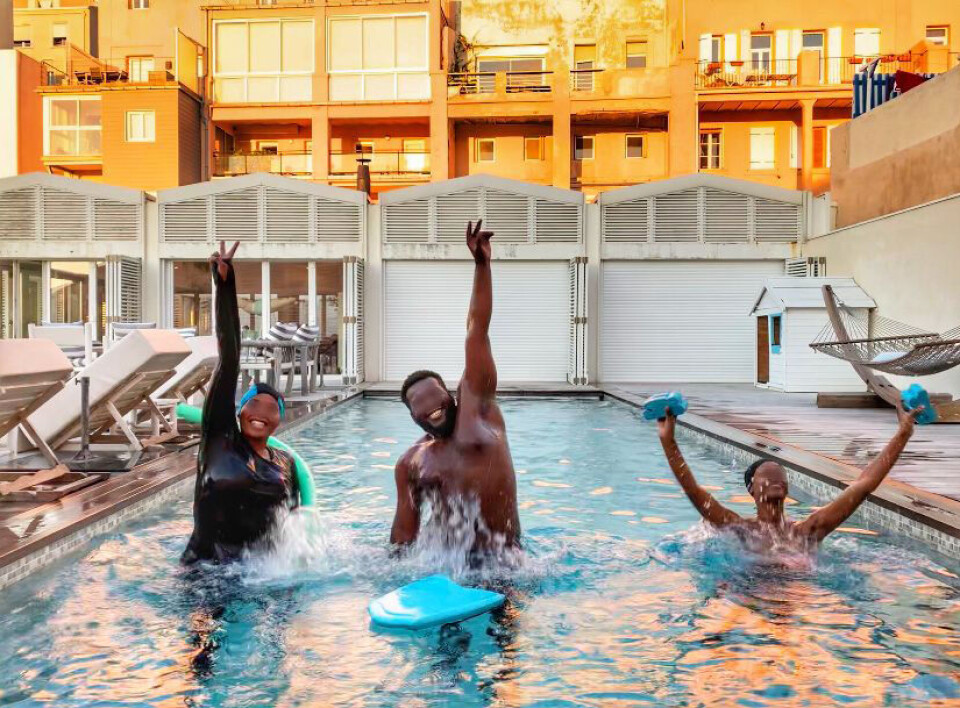-
Many Société Générale customers to be charged additional fees from April
There is some good news for international banking and instant transfers, however
-
Why gas prices in France are rising in April - and by how much
It comes after six consecutive monthly rises. Try these tips to reduce your bills
-
New notaire data suggests easing of Paris property crisis
Property experts have talked of ‘easing pressure’ and ‘breathing space’ after a four-year slump
Marseille residents loan pools so disadvantaged youth learn to swim
In a city where almost half of children cannot swim, pool-owners are giving access to pools so young people can learn to swim or obtain lifeguarding diplomas to get work

Residents in Marseille are lending their private pools for free so underprivileged local young people can learn to swim and increase their employability.
The premise of the Une Piscine Un Job (One Pool One Job) project is simple: residents whose homes have pools lend them out for swimming classes, led by certified instructors, where disadvantaged young people can learn to swim or train for lifeguarding diplomas.
The idea was born in entrepreneur Christopher Barolotto’s swimming pool and brought to life with the support of various Marseillaises organisations including Impact Jeunes, La Fabrique du Nous and Marseille Solutions.
In Marseille, 40-50% of pupils entering CM2 (aged 10-11) do not know how to swim, according to a study carried out by the city.
The figure is worse in ‘priority’ schools with a high percentage of low-income students: "75% of young people who enter the sixth grade [aged 11-12] in REP+ schools do not know how to swim," Nathalie Gatellier-Vignalou, in charge of the Impact Jeunes programme, told Made in Marseille.
However, the inability to swim is more than just a cause for embarrassment. It limits young people’s leisure activities, many of which centre around water sports in Marseille, and job opportunities, completely eliminating entire fields of work.
The One Pool One Job project aims to counter this. To be eligible, participants must be aged at least 16 and live in designated socio-economically disadvantaged neighbourhoods called quartiers prioritaires.
The project launched this summer and, so far, 20 young people have benefited, five of whom have already passed the lifeguard training. Four private pools were used.
Impact Jeunes’ Communication Officer Mohamed Mahdani said the scheme also breaks down social prejudices: “There are plenty of preconceptions people have but the programme allows young people and professionals to exchange opinions and see each other’s point of view.”
While the project started off on a small scale, next year’s goal is to secure 15 pools and help 75 youths learn to swim or gain lifeguarding diplomas.
Mr Mahdani said there is also currently “a partnership being created with [real estate developer] Constructa who will welcome the young people in a slightly more recurrent way.”
Drowning is the leading cause of accidental death in France in people under 25, according to Santé Publique France.
The low swimming rate in Marseille may come as a surprise considering the city’s 57km of coastline. However, this may be due to the shortage of public swimming pools or their frequent closure.
The city’s Deputy Mayor in charge of sports, Sébastien Jibrayel, told Made in Marseille, “The Ministry of Sports recommends between 15 and 20m² of swimming pool for 1,000 inhabitants, we are in a city where we are 6m² for 1,000 inhabitants and in the northern neighborhoods 4m² for 1,000 inhabitants."
It seems that the issue is gaining more attention, as Marseille has hosted in recent months various schemes aimed at teaching children to swim, such as J’apprends à nager (for ages 4-12) and Un pas vers la mer (for ages 6-14).
Related Articles:
Calls for ‘swimming licence’ to reduce number of drownings in France
Danger of hidden currents for sea swimmers in southwest France
French tax office begins to use aerial shots to find undeclared pools
























